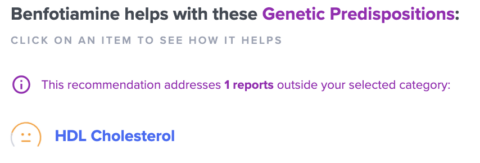
Benfotiamine is a synthetic version of thiamine, also known as vitamin B1, which is essential for many of the body’s functions including strengthening the immune system and protecting the brain. Research suggests benfotiamine may be especially useful for protecting the body from the harmful byproducts of too much sugar and improving symptoms of diabetes and Alzheimer’s disease. Keep reading to learn more about this supplement.
What Is Benfotiamine?
Benfotiamine is a fat-soluble derivative of thiamine (vitamin B1) that is more easily absorbed through digestion [1].
Benfotiamine is altered by gut enzymes (phosphatases) and then broken down into thiamine by red blood cells or in the liver [2].
In animal studies, taking a benfotiamine supplement increased blood levels of vitamin B1 five times as much as an equal dose of thiamine [3, 4].
Mechanisms of Action
Benfotiamine may work by:
- Activating the enzyme transketolase, a necessary part of the pentose phosphate pathway that turns sugars into sources of energy instead of harmful advanced glycation end-products (AGEs) [5, 2, 6, 6]
- Changing the production of specific enzymes (Nos3, PKB/Akt) to increase cell regeneration and reduce cell death [7, 8, 9, 10]
- Altering how energy is used in cells to enhance healthy growth and suppress cancer development [11, 7, 12]
- Decreasing inflammation in brain cells and white blood cells [11, 13]
- Inhibiting the GSK3b gene, which improves brain health [14, 15]
- Inhibiting the NOX4 gene, which improves the breakdown of sugar in muscles [16].
Health Benefits of Benfotiamine
SelfDecode has an AI-powered app that allows you to see how Benfotiamine benefits your personal genetic predispositions. These are all based on clinical trials. The orange neutral faces denote a typical genetic risk of developing conditions that Benfotiamine counteracts.

Possibly Effective for:
1) Complications from Diabetes
Although it increased both insulin levels and the breakdown of sugar for energy in animal and cell-based studies, the most promising benefit of benfotiamine in diabetics comes from its ability to block the production of the sugar byproducts that cause diabetic complications (advanced glycation end-products or AGEs) [17, 5, 18].
Indeed, benfotiamine reduced the levels of AGEs in 3 small trials on 56 diabetic people [19, 20, 21].
When paired with slow-release alpha-lipoic acid, benfotiamine reduced complications in nine diabetic patients by normalizing levels of AGEs and inhibiting other harmful protein reactions [19].
Benfotiamine has been most widely investigated for improving AGE-derived nerve damage that causes weakness, numbness, and pain (neuropathy) in people with this condition.
In 4 studies on over 250 diabetic patients with neuropathy, 6-12 weeks of benfotiamine supplementation improved nerve damage and its symptoms, including pain. Benfotiamine also reduced the pain caused by inflammation and nerve damage in diabetic mice [22, 23, 24, 25, 26].
A combination of benfotiamine and vitamins B6 and B12 improved nerve damage and feeling in fingertips in two studies with 80 diabetic patients [27, 23].
However, two clinical trials (both 6-week and 24-month studies) in 90 diabetics found that benfotiamine supplementation did not improve nerve function, reduce inflammation, or improve blood vessel function [28, 29].
The daily supplements of benfotiamine protected 13 diabetic patients from the potentially harmful effects of a meal that contained high levels of AGEs by reducing free radical damage and blood vessel dysfunction [30].
Benfotiamine protected diabetic mice from the harmful effects of excess sugar on the cardiovascular system. It improved circulation and blood vessel health, strengthened heartbeats, and reduced heart muscle cell death [10, 7, 9].
Benfotiamine increased the breakdown of sugar while reducing the production of NOX4 in muscle fibers. The NOX4 gene is involved in heart failure, kidney failure, and diabetic nerve damage [16].
Benfotiamine also protected human retinal cells from high blood sugar by stabilizing cell structure and reducing cell death [8].
Benfotiamine improved blood vessel health and kidney function in diabetic rats when combined with fenofibrate, a drug primarily used to reduce cholesterol [31].
However, benfotiamine alone failed to improve kidney damage due to diabetes (diabetic nephropathy) and prevent AGE buildup in a clinical trial on 82 people [32, 33].
Taken together, the existing evidence suggests that benfotiamine may help with some diabetic complications caused by the buildup of AGEs, especially nerve damage, although the results are mixed. Other potential benefits have only been studied in animals and the supplement is possibly ineffective for kidney damage due to diabetes. Discuss with your doctor if benfotiamine might help with your diabetic complications.
2) Damaging Effects of Alcohol
Alcoholics are typically deficient in thiamine, which impairs their cognitive abilities and psychological well-being. Daily supplementation with benfotiamine improved depressive symptoms in 85 long-term alcoholics and reduced drinking in 21 alcohol-dependent women, suggesting it may facilitate recovery [34, 35].
However, a drug more commonly used for spinal cord injury, cerebral palsy, and multiple sclerosis (baclofen) was more effective than benfotiamine to prevent relapse in a clinical trial on 122 alcoholics [36].
In 2 trials on almost 100 people, benfotiamine improved nerve damage caused by alcohol (alcoholic polyneuropathy). Its combination with vitamin B6 was also effective in 2 trials on over 300 people [37, 38, 39, 40].
A dose of benfotiamine 30 minutes after consuming alcohol protected the liver from damage in mice [41].
Promising but limited evidence suggests that benfotiamine may help with alcohol withdrawal and alcoholic polyneuropathy. You may discuss with your doctor if it may help as an add-on therapy in your case.
Insufficient Evidence for:
The following purported benefits are only supported by limited, low-quality clinical studies. There is insufficient evidence to support the use of benfotiamine for any of the below listed uses. Remember to speak with a doctor before taking benfotiamine for these purposes and never use it as a replacement for approved medical therapies.
1) Osteoarthritis
The buildup of AGEs also contributes to the progression of osteoarthritis. An AGEs inhibitor with benfotiamine and vitamins B6 and B12 taken for 24 weeks reduced pain and inflammation while improving mobility in a clinical trial on 30 people with this condition [42].
2) Reducing the Harmful Effects of Smoking
Smoking increases inflammation and oxidative stress in blood vessels, which can eventually lead to blood vessel dysfunction. Benfotiamine reduced these harmful effects by half in a small trial with 20 participants [43].
3) Reducing the Adverse Effects of Hemodialysis
In a pilot study, benfotiamine enhanced the antioxidant defenses and reduced DNA damage in 15 hemodialysis patients [44].
Benfotiamine also protected the kidneys and gut of rats during dialysis by reducing harmful AGEs in the blood and stabilizing cell structure to reduce cell death [45, 6].
4) Alzheimer’s Disease
Benfotiamine improved the cognitive abilities of 5 patients with mild-to-moderate Alzheimer’s Disease [46].
Similarly, it reduced cognitive impairment and the buildup of a protein that triggers Alzheimer’s (beta-amyloid) in mice [47, 48].
In a cell-based study, benfotiamine prevented the accumulation of plaques associated with Alzheimer’s disease in brain cells by reducing the production of GSK3 [14].
Benfotiamine also reduced inflammation in brain cells, a known cause of neurodegenerative diseases [11].
Animal and Cell Research (Lack of Evidence)
No clinical evidence supports the use of benfotiamine for any of the conditions listed in this section. Below is a summary of the existing animal and cell-based research, which should guide further investigational efforts. However, the studies should not be interpreted as supportive of any health benefit.
Depression and Anxiety
Benfotiamine reduced depression symptoms and improved mental function in mice by decreasing production of GSK3b. This triggers serotonin pathways that may reduce anxiety and help heal damaged brain cell connections [15].
Benfotiamine reduced the impact of stress on mice, improving anxiety symptoms and reducing brain cell degeneration [49].
Recovery from Heart Attack
By enhancing the growth of new blood vessels and decreasing the rate of cell death in mouse hearts, benfotiamine improved the rate of recovery after a heart attack [50].
Inflammation and Pain
Benfotiamine prevented cell death and inflammation due to bacterial toxins in mouse immune cells [13].
Taken with resveratrol, a natural phenol found in the skin of grapes, benfotiamine reduced pain in mice [51].
Chemotherapy Side Effects
Benfotiamine protected nerves from damage due to chemotherapy in rats when paired with erythropoietin, a hormone that stimulates the production of new red blood cells.
Limitations and Caveats
Most clinical trials on the supplement concern diabetics with nerve damage. Additional clinical research will be necessary to confirm the health benefits of benfotiamine in individuals with other diseases and conditions.
Side Effects & Precautions
Keep in mind that the safety profile of benfotiamine is relatively unknown, given the lack of well-designed clinical studies. The list of side effects below is not a definite one and you should consult your doctor about other potential side effects based on your health condition and possible drug or supplement interactions.
There have not been any adverse effects from benfotiamine alone reported in the scientific literature. However, there is anecdotal evidence of nausea, dizziness, and low blood pressure in some cases.
Drug Interactions
Supplement/Herb/Nutrient-drug interactions can be dangerous and, in rare cases, even life-threatening. Always consult your doctor before supplementing and let them know about all drugs and supplements you are using or considering.
Research on interactions involving benfotiamine and thiamine is lacking. Benfotiamine may be useful when taking medication or supplements that lower blood levels of vitamin B1, such as diuretics and certain heart medications [52, 53].
Benfotiamine contains sulfur and is therefore not recommended for people with sulfur sensitivity.
Supplementation
Because benfotiamine is not approved by the FDA for any conditions, there is no official dose. Users and supplement manufacturers have established unofficial doses based on trial and error. Discuss with your doctor what dose may be preferable in you case.
Dosage
Clinical trials have found benfotiamine to be most effective in dosages of 300 to 600 mg per day, divided into two doses [23, 34].
User Experiences
The opinions expressed in this section are solely those of benfotiamine users, who may or may not have medical or scientific training. Their reviews do not represent the opinions of SelfHacked. SelfHacked does not endorse any specific product, service, or treatment.
Do not consider user experiences as medical advice. Never delay or disregard seeking professional medical advice from your doctor or other qualified healthcare providers because of something you have read on SelfHacked. We understand that reading individual, real-life experiences can be a helpful resource, but it is never a substitute for professional medical advice, diagnosis, or treatment from a qualified healthcare provider.
Most users took benfotiamine for all sorts of painful conditions, including diabetic neuropathy, fibromyalgia, and eye inflammation (uveitis). They generally reported substantial improvement without adverse effects. However, some dissatisfied users complained that the supplement didn’t work.

